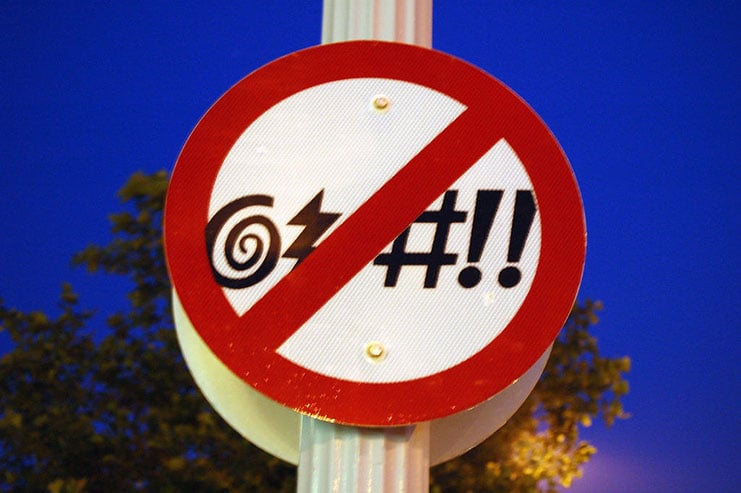In the last year, I’ve become a fan of commentator Megyn Kelly. She passionate, she’s easy on the eyes, and she’s crystal clear about where she stands on political and cultural issues. She’s a lifelong Catholic and, with her husband Douglas Brunt, has three children, the oldest of whom is in her mid-teens.
And I’ve noticed she’s taken to lacing her broadcasts with what parents used to call “potty mouth.”
Kelly’s obscenities always catch me a little off guard. Sometimes they seem intended as a shock effect, like a 13-year-old trying out vulgarities she’s picked up at school. When she says these things, I wonder if she cares that her children—or someone else’s kids—may be listening. For all I know, perhaps potty mouth is commonplace in the Brunt-Kelly home.
Of course, Kelly’s not alone in her crudity, especially in the United States. A WordTips analysis of 1.7 million tweets found that our country, by a wide margin, has the dubious honor of leading the world in swearing.
Evidence of a fondness for expletives extends beyond social media. For decades, F-bombs, scatological language, and blasphemies have been common in films. Books appear with these same curse words in the title. In 2007, for example, just a year before his death, the eloquent conservative William F. Buckley published “Cancel Your Own Goddam Subscription.” Etsy features an entire subsection “Obscene T-Shirt,” most of which are too groody to cite here.
Then there are the people we encounter in our everyday lives. In my town of Front Royal, Virginia, population 16,000, passing cars sometimes blare out the gross lyrics of rap songs. It’s commonplace to hear passersby on the sidewalk slinging out casual curses in conversations with friends or on the phone.
Some observers applaud this practice. Search online for “Is swearing bad?” and you’ll find plenty of articles and blogs arguing a positive case for expletives. Some of these writers contend that cursing relieves stress and is a plus for good health. Others hold that that swearing accents our passion or anger, and can convey honesty.
Meanwhile, those opposed make their case. Of these, Anna Brink in “Why Is Swearing Bad, Mom?” makes the most succinct and commonplace arguments against profanity. While waiting in line at a store, she and her young son listened as two teenage employees bantered back and forth unleashing all manner of expletives. That incident determined Brink to arm herself with answers if her son asked why swearing was bad. She came up with these four objections: the words you choose influence what others think of you, the opportunities you receive, your relationships, and your ability to communicate effectively. “Using ‘garbage words’ instead of thoughtful words,” she concludes at the end of her article, “throws away the beauty and usefulness of language.”
Here I will make another case for cleaning up our collective act. Since 2018, acclaimed actor Robert De Niro has launched several obscenity-heavy fusillades against Donald Trump while Trump was both our president and more recently, a candidate for that office. Most observers found De Niro’s tirades either repugnant or juvenile, and some fans of his movies—I’m one of them—have sworn off watching his films forever. It’s one thing to take the president to task with a strong condemnation of his policies or his character, but the bellowed curses were a bridge too far. Ironically, De Niro’s obscenities bounced right off Donald Trump, if he was even aware of them, while they ricocheted back and cost De Niro any gravitas he may have possessed.
And here’s my point: this gravitas, this dignity of manner, the way we carry ourselves, and how we are perceived are undermined by our misuse of language, whether by lies, by blaming others for our failures, and yes, by cursing. It is one thing to unleash an expletive when slamming our fingers in a car door or in some desperate fight on a battlefield. It is quite another to make swearing a component of our everyday language or to serve as a weapon for attacking another. Pop-off responses are understandable, but casual profanity damages the foundations of our humanity.
As a teenager, George Washington copied out his now famous “Rules of Civility & Decent Behavior.” Of these 110 Rules, Number 49 reads “Use no reproachful language against any one neither curse nor revile.” With the possible exception of the Battle of Monmouth, when he spoke sharply to General Lee about a retreat in progress, throughout his life Washington held his tongue when it came to uttering oaths.
In August 1776 at Valley Forge, he asked others to do the same. There Washington issued a general order to his officers and men beginning, “The General is sorry to be informed that the foolish and wicked practice of profane cursing and swearing, a vice hitherto little known in our American army is growing into fashion.” Likely equating profanity with blasphemy, he then enjoins all to turn away this “impiety and folly.” He ends by noting “it is a vice so mean and low without any temptation that every man of sense and character detests and despises it.”
In this new century, our dress and our manners have taken a tumble. Corrupting and dumbing down our language constitute one more step into that degradation of culture and decorum.

Leave a Reply